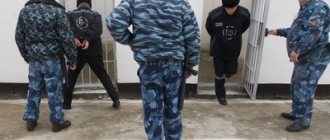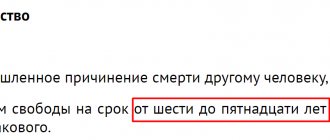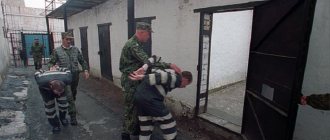Main
So, recently, many Russian citizens have been very interested in the question of how a strict regime differs from a general regime. In fact, their differences are very significant. After all, those who have committed serious crimes for the first time are sent to a general regime colony. Strict - only repeat offenders and those who committed a very serious criminal act for the first time. In addition, it should be said that these two regimes are very different from each other in that one has more relaxations than the other.
Of course, people working in correctional institutions know that in general everything is much simpler than in strict ones. Nevertheless, according to many experts and former prisoners themselves, the harsher the conditions, the faster the correction occurs.
The difference between the KSR and a standard prison
Prison is a fairly general modern concept. It is the name given to every correctional facility in which criminals are kept. Many people include a colony under this concept, thereby being seriously mistaken.
A colony for criminals and a prison are different types of modern correctional institutions!
The main difference is the restriction of a person within the boundaries of the colony. A jailed offender must remain in his cell at all times. He goes out only once for a walk and is strictly accompanied by an escort.
The colony is not a building, but a special gated community. Here are those who have been sentenced not to imprisonment, but to deprivation of liberty. The colony village has the following facilities:
- Working labor zones.
- Sleeping barracks.
- Official administrative part.
- Reading rooms and libraries.
- Small private shops.
- Heating facilities.
The regime of stay here is freer for people, which cannot be said about prisons. The criminal does not need to sit in cells around the clock.
In the colony and in the standard prison, three systems of criminals are established - ordinary rules of detention, strict and especially strict regimes with strong restrictions. The court decides which of the established options to place the offender.
Repeat offenders who are dangerous to society and those who have committed particularly serious acts are placed in prisons. Children and sick people are not put in a prison cell. They are sent to a colony.
To summarize what has been said, we can highlight some distinctive features between prison and penal colony:
- Restriction in desired movement. Prisoners leave their prison cells for a walk, to negotiate with a lawyer, or to visit their relatives or spouses. While in the colony, you are allowed to leave the residential barracks and visit nearby blocks. The main thing is to adhere to the established rules and regime.
- Work. In colonies, criminals work in barracks specially designed for this purpose and receive a salary. As for the prison, there are only a few special cells where work is carried out. The bulk of prisoners remain in prison day after day with nothing to do.
- Categories of institutions. An ordinary colony is intended strictly for the correction of offenders. Imprisonment is assigned to criminals who have minimal likelihood of rehabilitation in society. Also, ordinary correctional colonies are therapeutic and aimed at education.
More about general mode
The activities of correctional institutions of this type are regulated by the penal legislation of the Russian Federation. In a general regime colony, convicts serve time for serious criminal acts committed for the first time, as well as for crimes of minor and medium gravity, if the judicial authority considers that the correction of such persons is impossible in a settlement. Criminals are sent to this correctional facility only after the sentence comes into force. Until this moment, the latter can appeal the verdict while in a pre-trial detention center or under recognizance not to leave. This is the law.
The general regime is considered one of the most common in our country. Convicted men and women serve their sentences in institutions of this type.
Conditions of stay in a strict regime penal colony
An EC of special content is a “small state” in which its own individual foundations and rules have been established.
The life of criminals here directly depends on the category of offenders, on the working personnel and on the skills of administrative employees. The main conditions and regime here are regulated as clearly as possible.
There are clear instructions on the number of dates, packages received and spending of personal funds. To understand the conditions under which criminals are kept in a high-security penal colony, it is worth studying the main points of its arrangement and functioning.
Internal organization
All modern colonies with strict conditions are divided into sleeping and production areas. There are several main localized areas in the residential zone:
- Library and reading room.
- Meal place.
- Medical Center.
- The place for washing is usually a bathhouse.
- The headquarters where employees of the administrative center live and work.
Criminals live in special cells of approximately 40 people. In the residential sections there are two or three bunk beds. On average, there is about 7 square meters per person. There is a walking area and a special punishment cell on the territory. Those who violate the established regime are sent to the punishment cell.
Maximum security prison
This is a closed colony. Only men who pose the greatest danger to society serve their sentences here. In a maximum security prison there are persons who have committed very serious criminal acts for the first time, as well as dangerous repeat offenders.
The conditions for serving a sentence in this institution are very harsh and include complete isolation from society. Nevertheless, former convicts believe that it is much easier to “sit” in a strict regime than in a settlement. After all, you don’t have to work here, but the state will still provide food and clothing.
It should also be noted that only men can serve sentences under strict regime. This type of correctional facility is not assigned to women. Because the law does not provide for this. Most likely, this is due to the peculiarities of female psychology. After all, the fair sex is much more impressionable than men. Therefore, serving a sentence under harsh conditions is unlikely to benefit them. It should also be noted that even if a woman has committed several very brutal murders, she will still be sent only to the general regime. Moreover, in Russia girls are not given life sentences. You need to know about this.
How are long-term meetings with relatives conducted?
A special procedure for such meetings has been established. Before meeting the convicted person, the visitor undergoes a thorough examination. We check for such prohibited things as:
- Cash.
- Drugs.
- All forms of weapons.
- Mobile.
Documents are carefully checked, relationships with the criminal are studied. The guest has the right to refuse screening, but this will automatically be grounds for canceling the scheduled appointment.
The room where the date is held is equipped with a telephone. If necessary, you can call security. After the end of the meeting, a bus arrives for the visitor, and the prisoner and convoy go to his checkpoint.
Comparative characteristics
What is the difference between a strict regime and a general regime? The answer to this question is spelled out in Articles 121 and 122 of the Penal Code. A number of restrictions are imposed on convicts of both regimes. This is manifested in the amount of money that can be spent on food and personal hygiene items, in the number of visits provided, and in the receipt of parcels, packages and parcels.
But in a strict and general regime, the perpetrator may be in ordinary, strict or light conditions. This will depend on himself, on his desire to work and improve.
The punishment cell is the most severe room
The most severe conditions of detention for persistent regime violators are created in the punishment cell. This is a punishment cell that is found in every prison. The conditions of detention there are regulated by Article 118 of the Criminal Code of the Russian Federation. Prisoners placed in a punishment cell are deprived of the right to telephone calls, visits, walks, parcels and parcels. They are prohibited from spending any amount on goods and food in prison stalls. At the same time, their prison rations have been reduced.
You are allowed to take a limited number of items with you into the punishment cell. These include a minimum set of personal hygiene products. The period of detention in a punishment cell cannot exceed 15 days. The cell in the punishment cell is very cramped. At 9 sq. meters can accommodate up to 8 prisoners. The cells are equipped with shelf-like bunks, without mattresses or blankets, and they rarely have windows.
The administration of closed institutions often creates additional inconvenience for prisoners in their cells. For example, small shelves that act as seats are attached to the bunks at an obtuse angle. This is done to make it uncomfortable for prisoners to sit. In exceptional cases, prisoners may be placed in solitary confinement without the right to communicate with anyone.
In addition
What is the difference between a strict regime and a general regime? This question is most often of interest to those citizens whose loved ones and acquaintances, by the will of fate, find themselves in places of isolation from society. So, under normal conditions, general regime prisoners can spend the funds in their accounts in the amount of no more than three minimum wages within one year. On the strict level it is even stricter - no more than two times the minimum wage. Thus, prisoners must eat mainly the food they are offered in the canteen.
In addition, when serving a sentence in a general regime colony, convicts have the opportunity to receive only four long-term visits and 6 short-term ones. On the strict level there are even fewer - only three of each type during the year. It should also be noted here that visits are granted mainly to close relatives. Although, with the permission of the head of the colony, even an “unofficial” spouse or friend can see the convicted person. Those who are planning to visit a convicted person in a colony need to know about this.
It must also be said that when comparing general and strict regimes, there is a difference even in the number of transfers that a prisoner can receive. After all, everywhere has its own conditions and procedures. In addition, most PSs adhere to the norms of current legislation.
If in a general regime a prisoner can receive six parcels and 6 parcels within one year, then in a strict regime - only four of each type. Thus, the differences here are very significant.
Strict conditions of detention in PKT or EPKT - what are the differences?
Each ITK (correctional labor colony or camp) has PKT (cell-type premises). It serves as the colony's internal prison. Since 1997, EPKT (single cell-type premises) began to be used to hold persistent violators of the regime. They are located outside the colony and are a structural unit of the regional department for the execution of punishments.
When prisoners are placed in the FCT, the postal address of the place where they are serving their sentence imposed by the court does not change. When punished in the form of EPKT, persistent violators of the regime are transferred to another city, and sometimes to a neighboring region. They change the postal address of the place where they are serving their sentence.
Compared to the punishment cell, PKT and EPKT have a more lenient regime for keeping prisoners. It depends on the administration of the closed institution how long the SUS will be assigned to the prisoner for his offenses. The maximum period of detention in the PCT, limited by current legislation:
- up to 6 months for men;
- up to 3 months for women.
Prisoners can be kept in the EPCT for no more than 1 year.
General
Many people who are interested in the question of why they are given a strict regime should know that they only end up in such correctional institutions for very serious criminal acts. For example, if an attacker has already served a sentence for taking the life of another person, and again committed the same act at a time when the criminal record had not yet been expunged, then he will be considered a repeat offender. Consequently, the judicial authority will send him to serve his sentence only under strict conditions.
If a person has committed an act for the first time, the sanctions for which exceed ten years in isolation from society, for this the perpetrator will also be sent to a strict regime. There are no prisoners here who simply shoplifted bread or punched another person in the face.
Therefore, when answering the question of why a guilty person is sent to a maximum security colony, for what crimes, it is necessary to turn to the norms of the current law. The Penal Code states that citizens who committed very serious acts for the first time, as well as repeat offenders, serve their sentences in such institutions. Even with excellent behavior and performance, convicts under strict regime are not always given parole. However, they are transferred to easier living conditions.
How are dates organized in the IR?
The number of visits allowed directly depends on the punishment imposed. With strict - three long and three short. Each option is characterized by its own characteristics.
Short-term meetings are relatively short meetings between criminals and their relatives. They are carried out according to the following rules:
- Meetings take place in special rooms equipped for this purpose.
- Special permission from the IC administration is required.
- The intruder is brought on a date by a convoy.
- It is strictly forbidden to transfer food and belongings at the meeting.
- The conversation must be listened to by colony staff.
- For especially dangerous criminals, the meeting is organized in a room with glass that separates the guest and the convicted person.
As for long-term meetings with a criminal, the management of the penal colony allocates several days for them. These meetings also require compliance with certain rules and requirements:
- Meetings take place in the colony premises or in special hotels located on the territory of the penal colony.
- If the hotel option is chosen, payment for the room falls on the convicted person or the guest.
- You are allowed to take juices, tea and food with you. The main thing is that they are not packaged in glass containers.
- The prisoner is prohibited from leaving the room where the meeting is taking place. If this happens, the meeting ends immediately.
- Long-term visits are allowed for close relatives and spouses. Roommates are not allowed.
- Permission for such meetings is given only to those convicts who do not violate internal regulations.
conclusions
So, it has now become clear that the general and strict regimes are very different from each other. First of all, this is manifested in the fact that those convicted who violated the procedure for serving their sentence in a colony settlement often end up in general. This happens in practice very often. Therefore, we should not forget that in the general regime, unlike the strict regime, there are no repeat offenders. Those people who committed acts of minor or moderate gravity are still serving their sentences here, but, according to the court, the latter cannot be in the settlement. Thus, we can conclude that the difference between the general regime and the strict regime is that there is a different contingent there. It is very important.
Convicts under strict regime cannot spend more than two minimum wages of money during the year on their needs from their personal account. Thus, they are forced to eat and use what is given in the colony.
In general mode everything is a little simpler. Moreover, many people here receive early release after a certain amount of time. Some are transferred to settlements for good behavior. There, the convicts serve the remainder of their sentence. This is a very good prospect for those who want to improve and return home quickly.
Why do you get special treatment?
At the moment, there are more than fifty special regime zones in Russia. However, only seven of them contain convicts sentenced to life imprisonment and potential death row prisoners. According to statistics, they contain about two thousand people. In accordance with Article 157 of the Penal Code of the Russian Federation, such prisoners must be kept separately from others.
According to Article 58 of the Criminal Code of the Russian Federation and in accordance with modern realities, the following may be sentenced to detention in a special regime :
- Convicts sentenced to life imprisonment.
“Pyzhi,” as such prisoners call themselves, receive such severe punishment for especially serious crimes: brutal and serial murders, terrorism, organization and participation in organized crime groups, drug trafficking on a large scale, hostage-taking, pedophilia, and so on.
- Potential suicide bombers.
Despite the fact that a moratorium on the death penalty has been introduced in the Russian Federation, the relevant articles have not been removed from the Criminal Code and Penal Code.
- Particularly dangerous repeat offenders.
According to Article 18 of the Criminal Code of the Russian Federation, especially dangerous recidivists are those convicted who have committed a serious or especially serious crime after two serious or one especially serious ones.
- As part of the transfer to EPKT for a period of up to 1 year.
Almost all EPCT of the Russian Federation are located on the territory of special regime penal colonies. A second trial is not required for placement there; a decision by the administration of the correctional facility where the convicted person served his sentence in the first trial is sufficient. EPKT is not formally a special zone, but the conditions of detention are comparable.
In Russia, there are no special regime penal institutions for women - all women, regardless of the severity of the crime, serve their sentences under the general regime (even the strict regime has been abolished). Life imprisonment also does not apply to women, elderly people (over 65 years of age) and minors.










